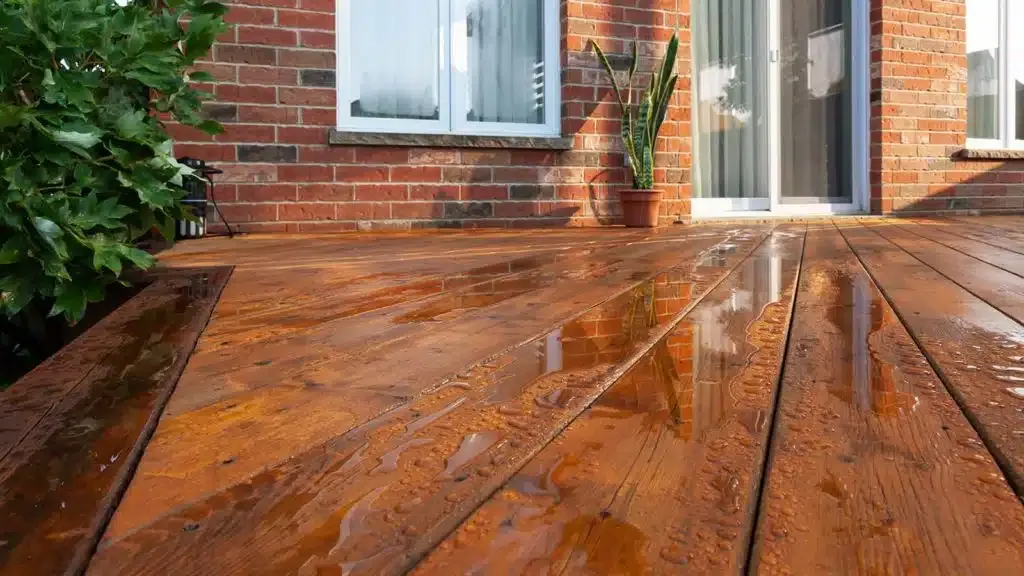
How Often to Seal Deck: The Complete Guide

Is your deck looking a bit weathered and worn? Those gray boards and peeling finish might be telling you something important! Many homeowners wonder how often to seal deck surfaces to keep them looking great and lasting longer.
We understand the confusion. You've invested good money in your deck, and you want it to stay beautiful for years to come. The good news is that with the right sealing schedule, you can protect your outdoor oasis from damage and extend its life significantly.
In this guide, we'll show you exactly when to seal your deck, how to tell if it needs sealing, and the simple steps to do it right. Let's make your deck maintenance easy and effective!
Why Sealing Your Deck Matters
Before we dive into timing, let's understand why sealing is so important:
Protection from the Elements
Your deck faces tough conditions every day:
Harsh UV rays that break down wood fibers
Rain and moisture that can cause warping and rot
Temperature changes that create expansion and contraction
According to the Forest Products Laboratory, unsealed wood can absorb up to 12% of its weight in water, leading to serious damage over time.
Extended Deck Life
A properly maintained deck can last decades longer. This Old House experts report that regular sealing can extend a deck's lifespan by 10-15 years!
Better Appearance
Sealing doesn't just protect—it beautifies:
Enhances the natural wood grain
Prevents discoloration and graying
Gives your deck a fresh, well-kept look
How Often Should You Seal Your Deck?
The big question: how often should you seal a deck? While there's no one-size-fits-all answer, here are the general guidelines based on deck type:
For Pressure-Treated Wood Decks
New decks: Wait 3-6 months before the first sealing to allow the wood to dry fully
Established decks: Every 1-2 years
According to Consumer Reports, pressure-treated pine typically needs resealing more frequently than hardwoods.
For Cedar or Redwood Decks
Every 1-3 years depending on sun exposure
More frequently if your deck gets full sun all day
For Hardwood Decks (like Ipe or Teak)
Every 2-3 years
These naturally oily woods need less frequent sealing
The American Hardwood Information Center confirms that dense hardwoods have natural oils that provide some inherent protection.
For Composite Decks
Many newer composite decks don't require traditional sealing
Some older composite materials benefit from sealing every 3-4 years
Trex, a leading composite decking manufacturer, notes that their current products are designed to never need sealing.
Signs It's Time to Seal Your Deck
Not sure if it's time? Here's how often should you seal your deck based on these visual cues:
The Water Test
This simple test never lies:
Sprinkle water on your deck
Watch what happens
If water beads up and stays on top, your seal is still working
If water soaks in quickly, it's time to reseal
Visual Indicators
Look for these warning signs:
Gray or faded color
Visible cracks or splitting wood
Rough texture when you run your hand over it
Visible mold or mildew spots
Factors That Affect Sealing Frequency
How often should a deck be stained and sealed also depends on these factors:
Climate and Weather Exposure
Hot, sunny climates: More frequent sealing (every 1-2 years)
Shaded decks: Less frequent sealing (every 2-3 years)
Rainy regions: More frequent sealing (every 1-2 years)
A study by Home Innovation Research Labs found that decks in areas with extreme weather may need sealing twice as often as those in moderate climates.
Deck Usage
High-traffic areas: More frequent sealing
Furniture movement: Creates wear on sealant
Grill or cooking areas: May need spot treatments
Quality of Previous Sealing Job
Professional application: May last longer
High-quality products: Extend time between sealings
Proper preparation: Critical for longevity
How to Properly Seal Your Deck
Now that you know how often should you seal your deck, here's how to do it right:
Step 1: Check the Weather
Choose a 3-day window with dry weather
Aim for temperatures between 50-85°F
Avoid direct sunlight while applying
The National Weather Service recommends checking the forecast for at least 48 hours after sealing to ensure no rain.
Step 2: Clean the Deck Thoroughly
Remove all furniture and plants
Sweep away debris
Apply appropriate deck cleaner according to product instructions
Rinse thoroughly with clean water
Allow to dry completely (usually 24-48 hours)
Step 3: Repair Any Damage
Replace any rotted or splintered boards
Hammer down any raised nails
Sand rough areas until smooth
Step 4: Apply the Sealer
Choose a high-quality deck sealer appropriate for your wood type
Stir (don't shake) the sealer to avoid bubbles
Apply with a roller, brush, or sprayer in the direction of the wood grain
Work in small sections to maintain a wet edge
Apply thin, even coats (usually 2 coats for best protection)
Allow recommended drying time between coats
Sherwin-Williams recommends using a natural bristle brush for oil-based sealers and synthetic brushes for water-based products.
Step 5: Allow Proper Curing Time
Keep everyone off the deck for at least 24 hours
Wait 48-72 hours before replacing furniture
Follow manufacturer's guidelines for full cure time
Tips for Extending Time Between Sealings
Want to maximize the time between applications? Here's how:
Clean your deck quarterly to remove dirt and debris
Trim nearby trees and bushes to reduce moisture and organic debris
Use furniture pads to prevent scratching the sealed surface
Clean up spills immediately to prevent staining
Remove leaves and standing water promptly
Conclusion
Understanding how often to seal deck surfaces is key to protecting your investment and enjoying your outdoor space for years to come. For most decks, plan on sealing every 1-3 years, but always use the water test to check if it's time.
Remember that a little maintenance goes a long way! By staying on top of your deck sealing schedule, you'll save money on repairs and replacement while keeping your outdoor space looking its best all year round.
Do you have questions about your specific deck? Leave a comment below, and we'll do our best to help you with your deck maintenance needs!

© 2025 | All Rights Reserved | Privacy Policy